- Home
- Sarah Hawkswood
Vale of Tears
Vale of Tears Read online
Vale of Tears
A Bradecote
and Catchpoll Mystery
SARAH HAWKSWOOD
For H. J. B.
Contents
Title Page
Dedication
Chapter One
Chapter Two
Chapter Three
Chapter Four
Chapter Five
Chapter Six
Chapter Seven
Chapter Eight
Chapter Nine
Chapter Ten
Chapter Eleven
Chapter Twelve
Chapter Thirteen
Chapter Fourteen
Chapter Fifteen
Chapter Sixteen
Chapter Seventeen
Chapter Eighteen
Chapter Nineteen
About the Author
By Sarah Hawkswood
Copyright
Chapter One
April 1144
The rider in the green jerkin knew the way well. He had travelled this route often enough not to admire the spring beauty of the Vale of Evesham, and, on this occasion, to let his mind wander to darker things; to think upon his sister. He shook his head, and his horse snorted as if in agreement with his thoughts.
Poor Edith, dead and buried without even a babe to her name. For all that the family had been proud of her marrying nobility, what good had it done the wench? None that he could see. His brother and their mother had been all in favour of it four years back, and crowed like dunghill cocks at their good fortune. He was only grateful now that Mother had not lived to see her only daughter shrouded and buried. Not that he had seen it either. Her lord was so ashamed of his lowly relatives, though not his wife’s looks or dowry, that he held them at arm’s length even at her death. News had only reached Evesham weeks later, when he had sent his steward with dues for some abbey land, and sent him also to announce her demise. The steward had said his lord grieved mightily, and that was the reason for him not coming in person, but all the lord need have done was send immediately to Evesham and they, her brothers, would have been there at her obsequies. Overwrought by grief? It sounded most unlikely. Her lord had always seemed aloof with her on those rare times Edith had received her relatives.
The man sighed heavily. He was rather more soft-hearted than those to whom he sold horses would ever have imagined. Edith, he thought, had deserved better, and a fine hall and rich hangings did not make up for a cold-hearted husband, and near estrangement from her own kin. How much better it would have been for her to marry Edric Corviser, and live out her days in the happy town bustle within which she had grown up. Perhaps she would have died as soon, but at least not haunted by the constraints of being ‘my lady’, nor of loving a man unworthy of her devotion. He should have listened to her more attentively at their last meeting, assuaged those womanly fears of hers, so that at least she would have departed this life unencumbered by doubts. Poor Edith, foolish Edith. To fall like that, on steps she knew well, must have meant her mind was elsewhere. Perhaps those worries had overset her. In which case, the lordly husband shouldered some blame. Yet, when brother had confronted husband, the man had looked down his noble nose and told his brother-in-law that he was a fool, and an offensive one at that, and if he so much as stepped upon his lands again he would have his men-at-arms teach him a lesson he would not forget and send him back to Evesham with lash marks that all would see. The rider fumed. He would put any profit from his next two sales for the monks at the abbey to say Masses for his sister’s soul, and her hard-hearted lord would live to regret how he had mistreated her, and her folk.
A chaffinch sang lustily on the bough of a crab apple. This first week after Easter 1144 fell at the beginning of April, and the male bird was in full courtship plumage, the slate grey of his head contrasting with the deep, rosy pink of his breast. The blossom was as yet mostly buds, but the first early flowers dared any frost to do its worst upon them. Primroses still adorned bank and spinney, and the green freshness of unfurled leaf and new grass was almost too much to assimilate. The glories of nature passed by at the pace of his trotting horse, whose ears flicked back and forth as a blackbird pinked in a hedgerow. He came shortly to the junction with another track. A rider approached and turned a neatish chestnut cob to take the same route. The rider, who wore his woollen cap at a jaunty angle, and seemed very pleased with the day, nodded in a vaguely amicable way, but said nothing for some time. They passed through the village with its broad greensward in its centre, and continued towards the river. Only as they approached the wooden bridge over the Avon did the happy man attempt to strike up a conversation. He complimented his new-found companion on his handsome horse.
‘Ah, now I can see as you are a man who knows his horseflesh, friend. Well up to your weight, and good haunches to him, has your beast. I’ll vouch he keeps a good pace all day and does not flag. My old fellow is not as impressive-looking, of course, but has stamina, and that counts for a lot, you’ll agree?’
The green-jerkined man nodded in a non-committal way.
‘You’ll be heading up to Stratford, perhaps? I am only going as far as Welford myself.’ The happy man seemed to look forward to the company.
The other rider murmured about heading south into Gloucestershire. This gregarious stranger seemed mightily keen to talk, and clearly took no notice that the responses were brief. He had returned to the subject of the horse again, and was extolling its good points when the cob jibbed suddenly. The man patted its neck placatingly, and heaved a sigh.
‘There, and I hoped the beast would have the sense not to play up with yours beside it.’ The rider shook his head. ‘I do not know why, but he has a dread of crossing water. I end up leading him every time, and cursing him roundly, especially when it means fording, though in all other respects he is a good horse.’ He dismounted, and rubbed the cob’s soft nose affectionately.
In truth, the animal did not look too distressed, but out of courtesy the man in the green jerkin also got off his horse, puffing slightly, for he was round of cheek and belly, and began to lead his own beast. The Avon was visible through the cracks between the boards. It passed beneath them, augmented by spring rains, but flowing clear and steady, with pike lurking in the sluggish margins among the weed and reeds for unwary prey. The horses clattered slowly over the wooden planks as the riders talked, and then, had anyone been looking, something strange happened. The rider of the cob stepped in front of the man in the green jerkin and turned to face him. A moment later the man in the green jerkin sank to his knees, but was hauled upright and tipped into the wet welcome of the river. Without so much as looking over the low rails, the other man mounted the cob, took the riderless horse by the bridle, and trotted back the way he had come.
The undershot wheel turned steadily, relentlessly, unhurried as always, belying the bustle within the mill as the wheat was ground between the great querns, and the flour slid down the chutes to the sacks beneath. Martin, the miller’s son, and Ulf the apprentice, watched them fill and lifted them away before they overflowed. Neither lad numbered more than thirteen years, but the labour gave them muscled arms and shoulders sturdier than their fellows in the village, excepting the blacksmith’s boy. Their faces were dusty white with the flour, and they coughed occasionally. Speech was a waste of breath, and brought only more coughing, so they worked in silence, each waiting eagerly for the cry of the miller above that the last sacks of grain had gone in for the morning’s grinding. Come noon they were able to ease their shoulders, and enjoy the fresh, clear air outside in the sunshine, while they lounged on the grass and took bread for their hunger, and small beer to wet dusty young throats. Then they could break their unwilling silence, and be their age.
They relaxed in the gentle April
warmth, though the breeze had a bite to it still, reminding them that this was spring and weeks yet from summer. It was Ulf who first noticed the body in the leat, thankfully before it caught in the wheel. A dead sheep had done so over the winter and been messy enough. He scrambled to his feet, pointing, and sending Martin running for his father and a stout pole. Wulstan the Miller did not doubt the boy, for he was pale, wide-eyed, and gabbling.
‘Nay, slow down, lad, or else I’ll not catch a word.’
‘A body, Father, a body in the leat. Come quick afore it is taken by the wheel.’
‘A beast you mean? A calf or—’
‘A man, honest, a man. Come.’ Martin tugged his father’s sleeve, though the miller needed no prompting.
Ulf had grabbed as large a stick as he could wield, and was trying to delay the progress of the corpse, with a modicum of success, though the force of the water in the narrow leat meant he was struggling. The body floated face down, the arms outstretched, the fingers white and puffy. It had been a man, clearly, and yet it was no longer a man but a grotesque parody of one. Wulstan brought a rake pole that they used to pull clogging weed from the channel, and between the lad and his master, the corpse was prodded into reach. The miller knelt and hauled the waterlogged body from the stream, needing all his considerable strength to pull it clear, and rolled it onto the grass to stare at the sky. Ulf cried out an oath and turned away, retching. The white, oedematous flesh had provided food for fish on its journey down river, and the face was ragged and unsightly. Wulstan crossed himself.
‘God have mercy. Best fetch the reeve, Martin. And Father Jerome.’ He shook his head. ‘It is ill folk will think of me for taking him out, but there was no choice once he was in the leat.’
‘Father?’
‘The Hundred pays a fine for any man dead by violence who is not proved English, son. It is called the murdrum fine, and King William imposed it upon us, lest we kill his men from Normandy. Not that I have seen more than a half-dozen men in my life as I would think foreign by speech or garb. No, these days it is really a tax, and a way to show the lords are “better” folk.’
‘Then cast him into the river proper again, Father, if you doubt he met his death by accident.’
‘Tempting, Martin, but this was a man. How would you feel if your kin were put back, aye, perhaps time and again, and kept from holy ground for the sake of such a risk? No, off you go, and tell nobody else on the way, mind.’
The boy ran, glad not to have to look at the ravaged face any more. He wanted to show he was made of sterner stuff than Ulf, but his gorge had threatened to rise, even so. He did not hear his father address the body, in a hushed whisper.
‘May you have drowned by accident, friend, and God have mercy on both you and us.’
The priest was easy enough to find, but the reeve’s wife could only say he was off with one of the village men, discussing some dispute over an orphaned lamb, and it was some time before Martin and Father Jerome caught up with him. The villager was most unwilling to see the reeve depart before he had made his position abundantly clear, and several times over, and since Martin could not reveal the reason for his urgent need for the reeve at the mill, it was fortunate that the priest was there to add his authority. Only as the three of them made their way along the Avon bank to the mill could the boy tell of what had turned up in the leat that noontide.
Oswin the Reeve looked grave, and even more so when he saw the body. Martin withdrew, having, he felt, been man enough already. Miller, reeve and priest looked down at the remnants of a middle-aged man, well clothed and booted, with a scrip still at his belt, and coin within it, as a brief investigation revealed.
‘The poor man drowned,’ sighed the priest, shaking his head. ‘So many fail to appreciate the river is not to be treated lightly.’
‘Well for sure he was not the victim of a robbery, God be praised,’ averred the reeve. ‘You only have to look at him to see that. If he fell in and drowned, then we might yet avoid the murdrum fine. Yet what worries me is those good clothes. This was no poor man, not by his garb, and the more chance he was not English.’
‘I had no choice, Oswin.’ Wulstan sounded apologetic.
‘No, that I grant you. Pity it is, though. Ah well, I had best head to Worcester in the morning, and report the corpse. Father, he can be kept in the cool of the church, yes?’
‘Of course, though we cannot shroud him until the law has seen him.’ Father Jerome sighed again. ‘We are blessed to be on the fertile edges of the river, but in its floods and what it brings us, we have to pay for that blessing. Have you a hurdle on which he could be carried, or a handcart?’
‘A handcart, yes. And some sacking to cover him decent enough. Wait here, and I will fetch both. Then I suppose we has to wait for the lord Sheriff at Worcester.’
William de Beauchamp, Sheriff of Worcester, had much to occupy him. Lady Day had just passed, and rents and taxes had to be gathered from the tardy and unwilling as the new year commenced. His own manors were in the midst of lambing, and his daughter Maud had been ailing of a fever and given his lady wife sleepless nights of worry, and requests for his immediate presence at Elmley Castle. Beset by myriad calls upon him, he was not a happy man, and when William de Beauchamp was not happy, nor were those who served him.
Serjeant Catchpoll headed the list of unhappy underlings. Since the sheriff of the shire would not go door to door with demands for payments, as usual the task was delegated to the sheriff’s serjeant. He did not like being set to the task with grumbling and curses, and he also disliked hunting down those unwilling, or indeed unable, to pay their dues, and regarded it as unworthy of him. For all that the tax-gathering gave Catchpoll his name, it was real crime that interested him − murders, blackmails and thefts, though the sheriff would have told him that not paying tax was stealing from the King and from him too, since he took his pennyworth of shrieval dues. Catchpoll had, therefore, in his turn, delegated a large part of it, this particular spring, to his ‘serjeanting apprentice’, one flame-headed Walkelin. Trouble was, Walkelin, whilst proving a keen young man, and useful in hunting criminals, had a long way to go in mastering the art of being ‘a right miserable bastard’, which was a prerequisite for acting as the lord Sheriff’s tax gatherer. Catchpoll had tried to teach him to smile in the face of the tales of woe with which he was everywhere presented, and to view with the utmost suspicion the promises to turn up at the castle gates the very next day with the missing monies, but all too often he returned with less than the sum due, and moved to pity by reports of infants who risked starvation, and elderly dames who would be cast into the streets without even a blanket to call their own. Catchpoll shook his head and winced.
‘I cannot decide which is worse, young Walkelin, you being so soft in the heart, or soft in the head. Half Worcester must know by now that they have but to show you a mite with big blue eyes and a trembling lip, and claim they went to bed hungry the last three nights, and you will be waiving their dues.’
‘But what about the Widow Saddler, then, Serjeant? She said as you had turned a blind eye these two springs past to her shortfall. Was she telling untruths?’
‘Ah.’ Catchpoll paused. Widow Saddler had five brats under the age of seven, and her husband’s business had gone to a cousin who considered kinship was all about taking, and nothing to do with giving. She worked hard, plying her neat stitches in bridles as before, but the cousin gave her nothing but a lean-to he rented as part of the property and expected her to stump up the rent money for it. ‘That,’ announced Catchpoll, decisively, ‘is exercising serjeant’s’ − he floundered for the term he wanted − ‘discreet-tion, and only to be used by serjeants with long years of experience. Besides, you’ll find I shake that nithing who runs Aelfraed Saddler’s business for the extra.’
He sent Walkelin back to chasing up the lagging taxpayers with a stiffened resolve.
Oswin, the reeve of Fladbury, reported first, as was right and proper, to his overlord, the
Prior of Worcester, since Fladbury was held by the priory. The Benedictine shook his head in sorrow, promised prayers for the dead man, and sent the reeve on to the lord Sheriff.
‘But what of the murdrum fine, Father Prior, if we cannot find a name and prove him English?’
‘We can but pray also that the fine is not levied. It is a grievous burden on the Hundred, for sure. But be positive. Were this man not English, surely he would have been remarked upon if lost? And he drowned, remember. Unless it was proved someone pushed him into the river, drowning is an accident.’
‘I hope so Father Prior, I do heartily. Wulstan had no choice but to take the body from the water, or else it would have been caught in the water wheel and been mangled, as well as perhaps causing damage to the mill.’
‘Oh indeed, he did right. This poor man needs now his name and decent burial with kin to mourn him. But even if that proves impossible, the Good Lord knows him already, and we will pray for his soul as fervently. Now go and inform the lord Sheriff, and hand the business over to the law.’
Oswin went from priory to castle and sought audience of the lord Sheriff. William de Beauchamp was not, however, available, since he was meeting a delegation of the Worcester burgesses, and Oswin had to make do with the sheriff’s serjeant. In truth, he found it far easier dealing with a man of his own rank and language, with whom he could discuss the matter frankly. At the conclusion he was given leave by Catchpoll to return home, with the assurance that the lord Sheriff would be told swiftly of the matter, and that most probably Fladbury would see the sheriff’s men in the next day or so.
It was several hours later that Catchpoll repeated the tale to his superior, who had had an irritating afternoon with the town worthies.
‘A body from the river! Well, like as not it is a drowning from somewhere. Nothing that I need investigate in person.’ He growled, and pursed his lips.

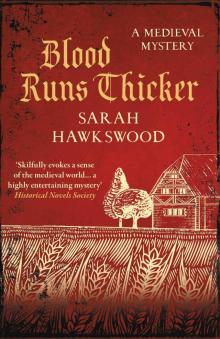 Blood Runs Thicker
Blood Runs Thicker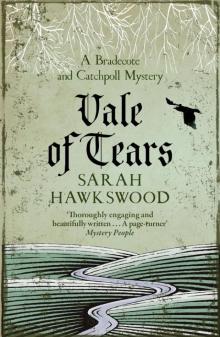 Vale of Tears
Vale of Tears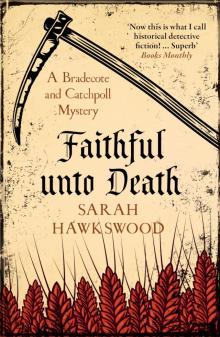 Faithful Unto Death
Faithful Unto Death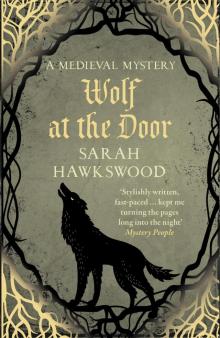 Wolf at the Door
Wolf at the Door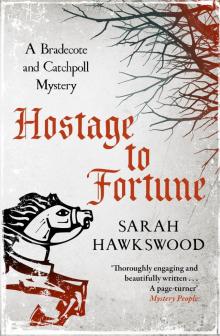 Hostage to Fortune
Hostage to Fortune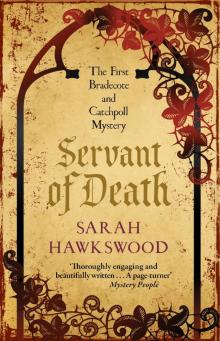 Servant of Death
Servant of Death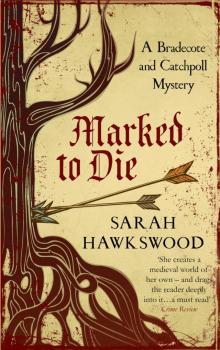 Marked to Die
Marked to Die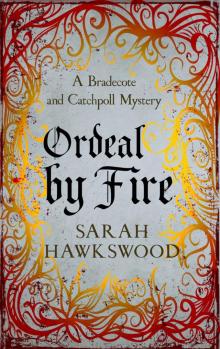 Ordeal by Fire
Ordeal by Fire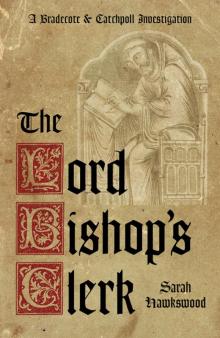 The Lord Bishop's Clerk
The Lord Bishop's Clerk